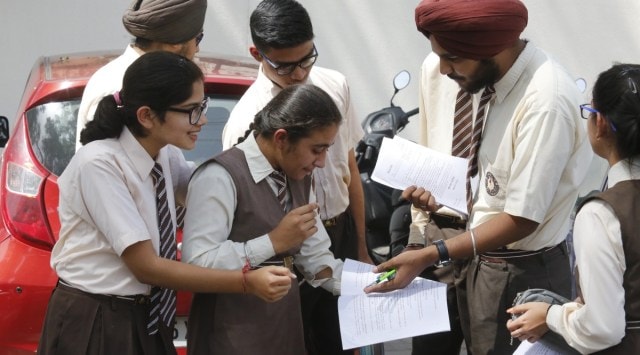Why has CBSE introduced competency-based questions in Classes 10, 12?
CBSE Board exams 2023: Let’s understand how the competency-based questions will change the CBSE question paper pattern, why was this required and how it will help students.
 CBSE Board Exams 2023
: As per the new exam pattern, at least 40 per cent questions in the CBSE class 10 exam and 30 per cent in class 12 exams in 2023 will be competency based. ( Express photo by Jasbir Malhi)
CBSE Board Exams 2023
: As per the new exam pattern, at least 40 per cent questions in the CBSE class 10 exam and 30 per cent in class 12 exams in 2023 will be competency based. ( Express photo by Jasbir Malhi) CBSE Board Exams 2023: The Central Board of Secondary Education (CBSE) recently introduced changes in the type of questions that will be asked in the CBSE board exams 2023. As per the new exam pattern, at least 40 per cent questions in the CBSE class 10 exam and 30 per cent in class 12 exams in 2023 will be competency-based.
The changes — as per Minister of State for Education, Annapurna Devi — have been introduced in line with the recommendations mentioned in the National Education Policy (NEP) 2020.
Let’s understand how these questions will change the exam pattern, why was this introduction required and how it will help students.
What are competency-based questions?
Competency-based questions are based on case studies, reasoning and assertion, response-based, objective type etc. These questions test the application of learning in real-life situations through various mediums, thereby understanding students’ higher-order thinking skills.
Saurabhi Joshi, Vice-Principal of Manav Rachna International School, Charmwood explains that the new pattern of questioning aims at expanding students’ thinking and enhances qualitative and logical learning as opposed to memorisation of core concepts.
“The new pattern sees a shift from content-based learning to conceptual, relatable and application-based learning. Competency-based questions test understanding of content/skill/concept learned and its application in a similar scenario. It helps assess and examine true understanding and potential as opposed to rote learning,” Joshi elaborates.
“The National Education Policy 2020 focused on creative learning and teaching methods. CBSE introduced competency based questions in accordance with it so that students of today can become leaders of tomorrow. The aim is to make students think out of the box, critically yet analytically and break the ages-old system of bookworm learning,” a senior CBSE official said.
Competency-based questions different from HOTS?
The introduction of competency-based questions isn’t a new change as higher order thinking skills (HOTS) questions were introduced in 2016 to test the competency level of students.
Experts believe that competency-based questions and HOTS are analogous assessment concepts introduced by CBSE, as both seek to test students’ high-order thinking skills and real and in-depth knowledge. But they are equally disparate in certain realms.
“HOTS are straightforward questions that require lucid and succinct answers. On the other hand, competency-based questions can be asked in MCQs, objectives, case studies and long-answer type questions. It will test students’ actual discernment and capabilities to answer questions that are not theoretical and passage-based. It will be challenge-based, requiring the use of common sense, genuine understanding, and the reasoning capacities of students,” Pooja Bose, Principal of Pacific World School said.
CBSE increases share of competency based questions
Earlier the share of HOTS questions in class 10 question paper was 30 per cent and in class 12 was 20 per cent which has now been increased to 40 per cent and 30 per cent, respectively.
Explaining the changes, Nidhi Kapoor Principal of Orchids International School, Jaipur said,” With a focus on strengthening students’ critical and creative thinking skills, competency-based learning helps them prepare for the challenges of the 21st century. It emphasises that assessments must change from testing rote memorisation skills to one that is more formative, more competency-based, supports learning and development for our students, and assesses higher-order skills like analysis, critical thinking, and conceptual clarity. It also stresses that learners must be equipped with the ability to solve problems.”
While the quantity of such questions has been increased, the unequal distribution of them in class 10 and class 12 persists. “Class 12 has more diversity and depth of topics that are superficially covered up to class 10. Theory in class 12 is equally important along with conceptual knowledge. Hence, 30 per cent competency-based questions since fact testing also become mandatory along with application and competency,” Joshi from Manav Rachna School highlighted.





- 01
- 02
- 03
- 04
- 05


























